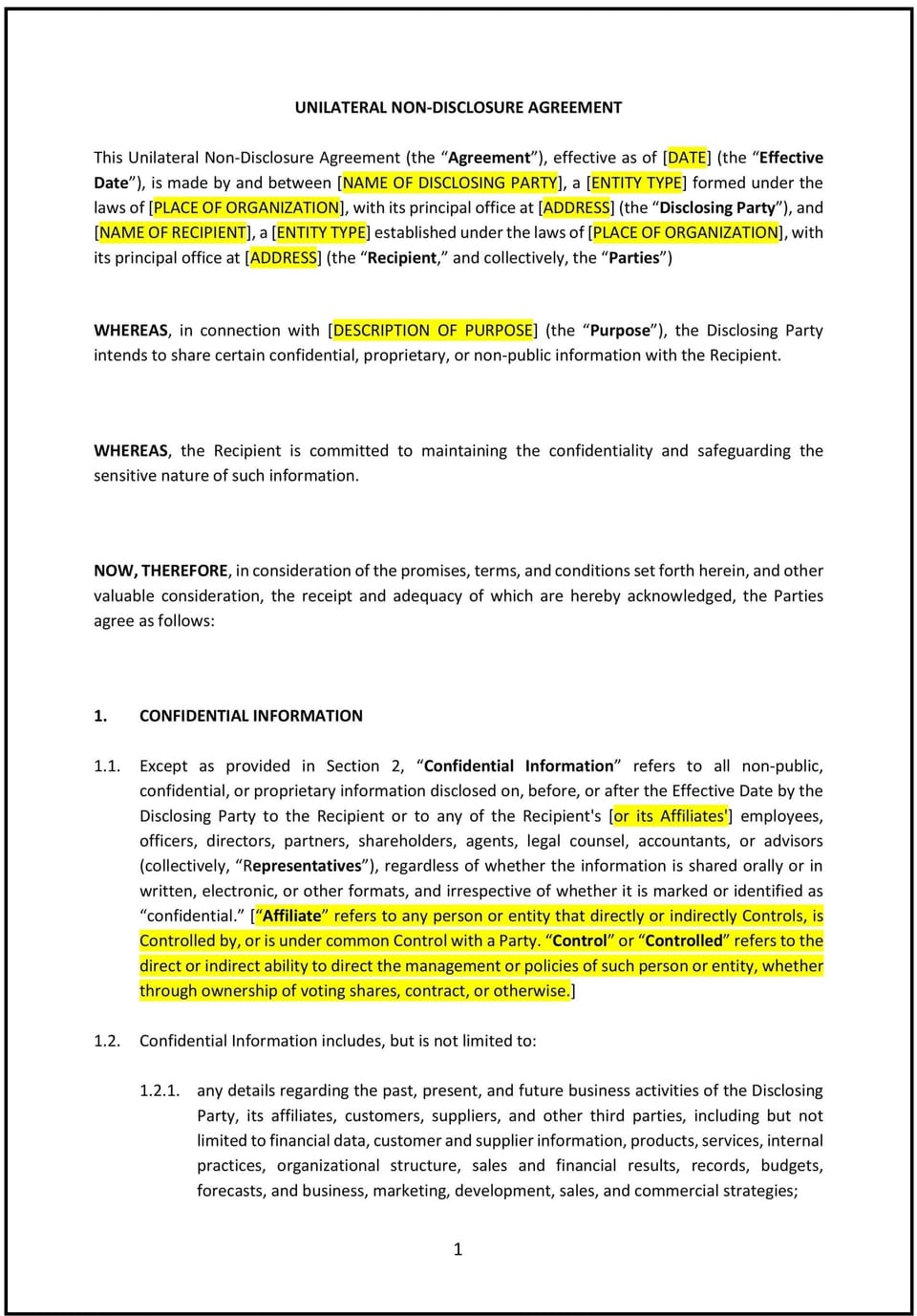Non-Disclosure Agreement (Unilateral) (Texas): Free template

Non-Disclosure Agreement (Unilateral) (Texas)
A Non-Disclosure Agreement (Unilateral) in Texas is a legally binding contract that protects confidential information shared by one party with another. Unlike a mutual NDA, a unilateral NDA binds only the receiving party to confidentiality obligations, making it commonly used when businesses disclose sensitive information to employees, contractors, vendors, investors, or potential business partners.
Texas businesses use unilateral NDAs to protect trade secrets, proprietary data, financial information, and other confidential materials. Texas law upholds NDAs that are clear, reasonable, and specific in scope and duration. Businesses should structure their NDAs to comply with the Texas Uniform Trade Secrets Act (TUTSA), which governs the protection of confidential business information.
Industries such as technology, energy, healthcare, and finance frequently use unilateral NDAs to safeguard intellectual property and prevent unauthorized disclosures. Ensuring the agreement is properly drafted helps businesses establish enforceable legal protections under Texas law.
Tips for drafting and maintaining a Non-Disclosure Agreement (Unilateral) in Texas
- Clearly define what qualifies as confidential information to avoid disputes over interpretation. Texas courts require specificity for NDAs to be enforceable.
- Establish a reasonable duration for confidentiality obligations. While most NDAs last between two to five years, trade secrets may require indefinite protection.
- Specify permitted disclosures, such as those required by law, court orders, or with prior written consent.
- Outline legal remedies for breaches, including injunctive relief, financial damages, and termination of agreements.
- Ensure compliance with the Texas Uniform Trade Secrets Act (TUTSA) to strengthen legal protections for trade secrets and proprietary business information.
Frequently asked questions (FAQs)
Q: What should Texas businesses include in a Non-Disclosure Agreement (Unilateral)?
A: Businesses should include definitions of confidential information, exclusions, duration, permitted disclosures, and remedies for breaches.
Q: How does a Non-Disclosure Agreement (Unilateral) benefit businesses in Texas?
A: It ensures that sensitive business information remains protected when shared with employees, contractors, or third parties, reducing the risk of unauthorized disclosure.
Q: Can a Texas NDA include a non-compete clause?
A: Texas law strictly regulates non-compete agreements, and they must be reasonable in scope, duration, and geographic area to be enforceable. Businesses should ensure any non-compete provisions comply with Texas law.
Q: How long should a Non-Disclosure Agreement (Unilateral) last in Texas?
A: The confidentiality period varies, but most NDAs last between two to five years. Trade secrets may require indefinite protection under TUTSA.
Q: Are verbal NDAs enforceable in Texas?
A: While verbal agreements can sometimes be legally binding, written NDAs provide stronger legal protection and are more easily enforceable under Texas law.
Q: How can Texas businesses enforce a Non-Disclosure Agreement (Unilateral)?
A: Businesses can seek injunctive relief, financial damages, or termination of agreements through Texas courts or arbitration if a receiving party breaches the NDA.
Q: What happens if an NDA is too broad or restrictive in Texas?
A: Texas courts may refuse to enforce an NDA if it is overly broad, restrictive, or places unreasonable limitations on a party. Businesses should draft NDAs with clear and enforceable confidentiality terms.
This article contains general legal information and does not contain legal advice. Cobrief is not a law firm or a substitute for an attorney or law firm. The law is complex and changes often. For legal advice, please ask a lawyer.


